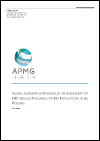Publications - Released in 2019
In 2017, key populations (KP) and their sexual partners accounted for approximately 40% of new HIV infections globally (UNAIDS, 2018). A range of policy and legal barriers and harmful social dynamics increase the HIV vulnerability of KP and undermine their access to HIV and other services. The criminalization of sex between men, sex work, drug use and HIV transmission, as well as high rates of incarceration, homophobia, trans phobia, violence and social marginalization, all serve to influence risk practices and undermine access to services. People from key populations often migrate to cities in search of safer and more secure communities (UNAIDS, UN Habitat 2015). Women in key populations face specific challenges and barriers, including gender-based violence (GBV) and poorly tailored services. These factors further intensify their vulnerability to HIV.






